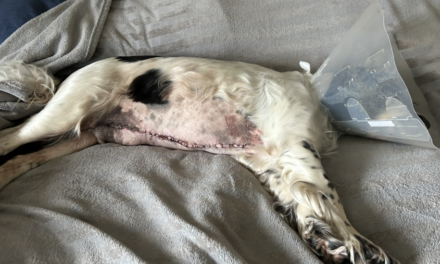The RSPCA is experiencing a rehoming crisis, with the number of animals arriving at its shelters far outpacing those being adopted.
In 2023, the charity took in 40,118 animals, a figure that is 42% higher than the 28,208 rehomed pets, leaving many animals in temporary emergency boarding while awaiting a place in rehoming centres across England and Wales.
This marks a worsening trend from the previous year, when the intake (37,910) was 39% higher than the rehoming figures (27,277). The growing gap is adding significant strain on the charity’s resources, prompting the RSPCA to launch its ‘Adoptober’ rehoming campaign, which encourages the public to adopt from rescue centres instead of purchasing from breeders.
Overcrowded Centres and Emergency Boarding
Karen Colman, head of the RSPCA team responsible for placing rescued animals, explained that the charity’s centres are overwhelmed. “Our rescue centres are jam-packed, and we’ve been seeing more animals coming to us than we are rehoming,” said Colman. “We urge anyone considering adding a pet to their family to step in and help by giving a rescue pet a second chance instead of buying from breeders.”
The influx of animals has reached crisis levels, with many being temporarily housed in emergency boarding kennels and catteries until space opens up at rehoming centres. The figures highlight a concerning trend, with more animals arriving than leaving shelters, putting immense pressure on the RSPCA’s 14 rehoming centres and 135 independently-run branches.
Last year’s figures show a 42% difference between intake and rehoming numbers, a sharp increase from the previous year’s 39% gap. This widening disparity suggests an urgent need for more homes for rescued pets.
Rising Intake Across Multiple Species
The first six months of 2024 have only worsened the situation. The RSPCA saw a 21% increase in dogs, a 16% rise in cats, and a 32% jump in equine intakes compared to the same period last year. Rabbits, however, showed a slight decline, down by 8.36%. The surge in intake across multiple species means the RSPCA must find solutions to house and care for the growing numbers of animals arriving at its centres.
Colman also noted that the lasting effects of the pandemic continue to impact dog intake. “We are still seeing the effect of the pandemic on dogs and an increase in those coming into care with complex behaviour, which is contributing to the pressure for spaces at rehoming centres,” she explained.
Cost of Living Crisis Adds to Rehoming Struggles
The RSPCA has also identified the rising cost of living as a key factor behind the increasing number of pets being relinquished to shelters. The charity’s Animal Kindness Index revealed that 77% of pet owners feel the cost of caring for their pets has increased, particularly due to higher prices for food and veterinary care.
The RSPCA’s independently-run branches continue to work tirelessly to rehome animals, playing a vital role in local communities. Despite the pressures, the charity remains proud of the work done by its staff and volunteers. “Our 135 independently-run branches continue to rehome at a phenomenal pace, and we are extremely proud of the work they do,” Colman added.
Helping the Most Vulnerable Animals
The RSPCA’s 14 national centres focus primarily on rescuing animals from cases of cruelty and neglect, providing them with veterinary and behavioural care before finding them new homes. These vulnerable animals often require longer periods of rehabilitation, making it difficult for the centres to keep up with the high intake rates.
“Our 14 national centres prioritise animals rescued from cruelty and neglect. They are the animals which need the most help with veterinary and behavioural care to rehabilitate them,” said Colman. “These most vulnerable animals take time to recover from the cruelty and neglect they have experienced, so it’s even more rewarding to see them ready to find loving new homes where they will be lavished with the love they deserve.”
Adoptober Campaign Aims to Boost Rehoming Rates
To address the crisis, the RSPCA is launching its ‘Adoptober’ campaign, which will run throughout October. The campaign aims to increase awareness of the benefits of adopting rescue pets and highlights the many animals waiting for their perfect homes. The charity hopes the campaign will inspire potential pet owners to consider adoption rather than purchasing pets from breeders.
One example of an animal waiting for adoption is Athena, a two-year-old German Shepherd crossbreed at the RSPCA’s Blackberry Farm Animal Centre in Buckinghamshire. Athena was rescued from poor living conditions and had a severely infected wound on her front leg. Despite the amputation of her leg, Athena remains resilient and active, enjoying activities such as digging and playing fetch. She has bonded with her handlers and is awaiting a permanent home where she can thrive.
RSPCA’s No-Kill Policy
The RSPCA has a strict policy of not euthanising healthy, rehomeable animals. Euthanasia is only carried out when advised by a vet, and only to prevent further suffering, whether physical or mental. However, the increasing intake means animals are staying in the charity’s care longer, as fewer spaces become available in rehoming centres.
As Adoptober gets underway, the RSPCA is hopeful that the campaign will help rehome more animals and ease the strain on its overburdened shelters. The charity continues to urge people to consider adoption and give rescue animals a second chance at a happy life.
Potential adopters can visit the RSPCA’s Find A Pet webpage to see all of the animals currently in the charity’s care who are looking for their perfect match. Supporters can also help the RSPCA continue rescuing, rehabilitating and rehoming by donating online or calling their donation line on 0300 123 8181.








